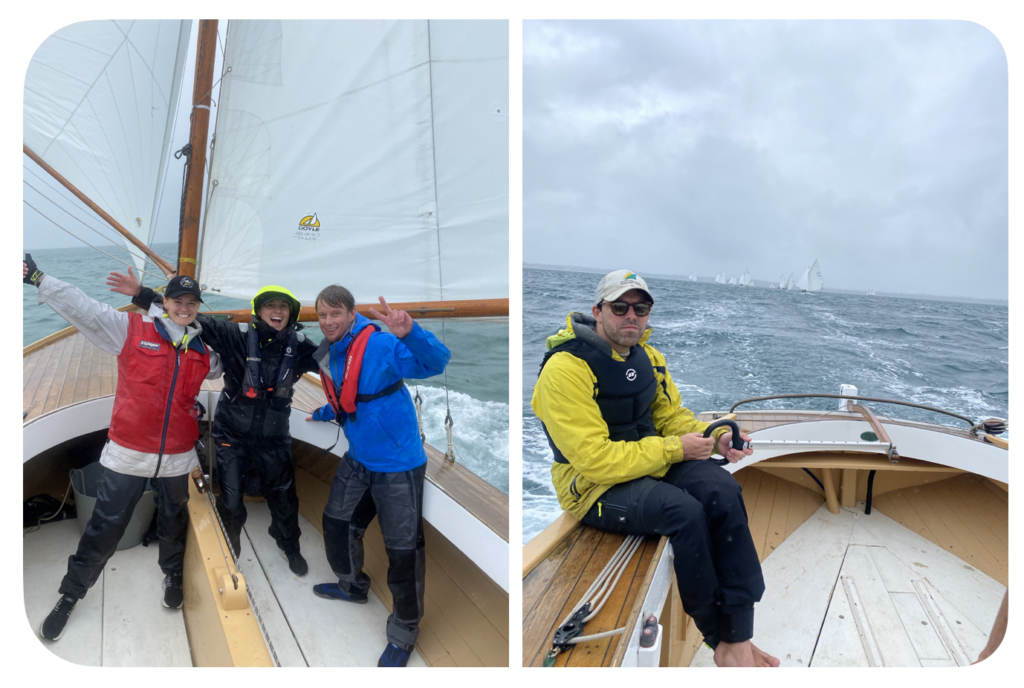
Shooting the Breeze: From Tauranga to Sorrento
By James “Jimmy” Granger
The Club Captain’s Column features weekly perspectives on different happenings around SSCBC. Each week the invited columnist takes time to reflect on their unique experiences in relation to sailing or boating. If you would like to provide feedback, or to submit your own story for consideration, please send an email to: sscbc.clubcaptain@gmail.com
This week the editors are proud to introduce Jimmy Granger, a much-valued staff member of The Wooden Boatshop. Originally hailing from New Zealand, Jimmy is an experienced Shipwright & Boatbuilder. For the three-race Wooden Boatshop series, Jimmy sailed aboard Margarita. He reflects on his experience of sailing a Couta Boat after having worked on them through many seasons, as well as his broader history and engagement in boating over the years. Jimmy is now a permanent crew member of Margarita.
It was Wednesday afternoon at The Wooden Boatshop when Emma Phillips called me up for sailing on the opening day of the WBS series, to be held on the following Saturday. My mind was racing with the jobs I had on my plate for the fast-approaching sailing season. Reluctant at the thought of sailing in favour of getting jobs finished, Emma successfully convinced me that there is a lot more to life than “work”. I grinned at the thought of my very first experience of sailing a Couta Boat. I was nervous at how I would manage due to being inexperienced and Deaf.


A couple of weeks earlier I was tasked with fitting new chainplates and shifting the mast aft on Margarita. Little did I know at the time my understanding of the power Couta Boats are capable of would truly blow me away! Harry Mighell was more than happy to invite me onboard for the races as a thank you for doing the jobs on his boat. Once we got the sails up and were underway towards the start line, we went through the basics of learning important sign language. Such as the sign for “tack”, and other gestures so we all could understand each other quickly if required.
As a starting point I was basically the cameraman and weight shifting person in the marginal breeze. As I became more comfortable, I got the feel of working the jib and mainsail during the tacks, until Harry kindly handed me the tiller on the home-run stretch. I automatically could feel how the boat was responding while cutting through the water with the wind. Using the skills I have acquired from previous smaller yachts and radio controlled Marbleheads, I sailed in a gentle zig zag line getting the hull up to good speed. I knew I was hitting some good speed when the floorboards started to vibrate under my feet.
On the following weekends the second and third races in the rain were just as much fun! It really is a fast-paced sport, and a good team does make the difference between winning and losing. But I quickly learnt that winning is not the main objective of sailing; the whole experience and goodness it does to our bodies and morale is priceless! On the third and final race I was privileged to have Olympic level sailors Will and Sam Phillips onboard; their skills were lightening fast! Their knowledge of reading how the wind behaves and fine tuning the sails gave me a valuable insight of what it takes to be a true Olympic sailor.


Let me tell a bit about myself. I originally come from New Zealand where I was born and raised in Tauranga. When I finished school, I moved up to Auckland to study at Auckland University of Technology, then did a year long Certificate in Boatbuilding. Upon completion I got a job at McMullen & Wing superyacht builder. My first job there was sweeping the floors and after 3 months I was awarded a dual apprenticeship in composites and wood.
Completing my apprenticeship was the hardest thing I ever had to do mainly because it was of a high standard and internationally recognised. I continued to build huge 45 metre and 50 metre super yachts up until late 2012 when a disastrous fire broke through and destroyed the building.
In 2014 I decided to embark on a new adventure and migrated to Melbourne, working for Hart Marine. The funny thing was almost nobody talked to me for awhile because they had never seen a Deaf boatbuilder before. In no time, I was making new friends after my colleagues observed the quality of my work. I decided in late 2016 that I ultimately wanted to settle down with wooden boats and found The Wooden Boatshop and the rest is history. I really like my company because you can’t go wrong with good looking, quality built and timeless wooden boats.












